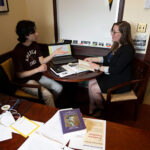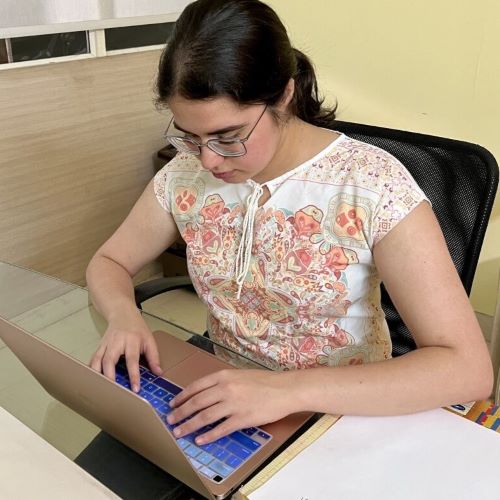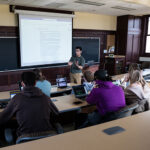
Wooster student studies dementia and aging during APEX Fellowship

Ruhee Mehta ’26 spent her summer interning at the National Institute of Mental Health and Neuroscience in Bangalore, India as part of an APEX fellowship. Mehta has yet to declare a major at The College of Wooster, but she is interested in neuroscience and already has a strong presence in student organizations on campus. While interning at the institute, Mehta learned to use MRI technology to understand the symptoms and progression of dementia as it correlates to aging in the Indian population. Under the mentorship of Paul L. Edmiston, professor of chemistry and biochemistry and molecular biology, Mehta took advantage of this experiential learning opportunity to refine her research and presentation skills.
“This internship has not only enhanced my interest in neuroscience, but also strengthened my interest in patient care.”
—Ruhee Mehta ’26
How did you learn about the internship opportunity for your APEX Fellowship? Why was the position a good fit for you?
“I learned of this internship opportunity through my father’s colleague. It was a good fit because the lab was very focused on asking questions and had a diligent, earnest culture that I resonated with.”
What interests you most about the work you did?
“As I worked, I better understood the sheer potential of MRI in neuroscience. I had previously worked with Alfredo Zúñiga, assistant professor of neurochemistry. He uses immunohistochemistry, which is utilized in optogenetics as well, which is something I hadn’t expected and found deeply fascinating. My activities included doing a variety of tasks around the lab, such as putting together presentations, data entry, studying for my own understanding, and answering questions asked to deepen everyone’s understanding of the research project being performed.”
Who was your fellowship mentor and how did they help you to succeed in this position?
“My mentor was Paul L. Edmiston. He provided feedback and encouragement through our reflections, and he supported me when I was having a tough time. His responses to my answers to the prompts helped me further contextualize and understand my experience interning.”
What are some skills you’ve learned that you see yourself carrying forward in your career?
“I gained strong research and self-learning skills— I want to be a doctor, and those are essential. Presentation skills are also important in every job. I learned how to interact with colleagues and adapt to a different working culture.”
How has the internship helped you to see what’s next for you?
“This internship has not only enhanced my interest in neuroscience, but also strengthened my interest in patient care. It has shown me how, through MRI, the field of neuroscience is intertwined with many other fields, such as computer science, physics, and more.”
Posted in Experiential Learning on August 10, 2023.
Related Posts
Related Areas of Study
Neuroscience
Psychology, chemistry, philosophy, computer science, and other disciplines combine in the study of the nervous system
MajorBiology
Explore molecular and cellular biology, ecology and more with top faculty and access to extensive lab facilities.
Major MinorBiochemistry & Molecular Biology
Biology and Chemistry combine in an interdisciplinary program for students with a passion for molecular events.
Major

